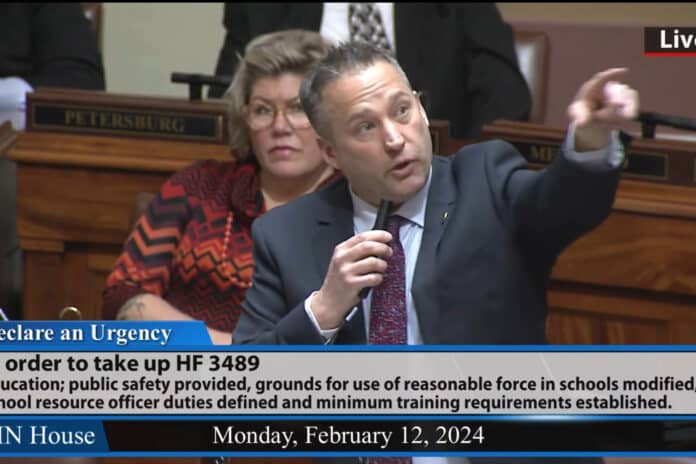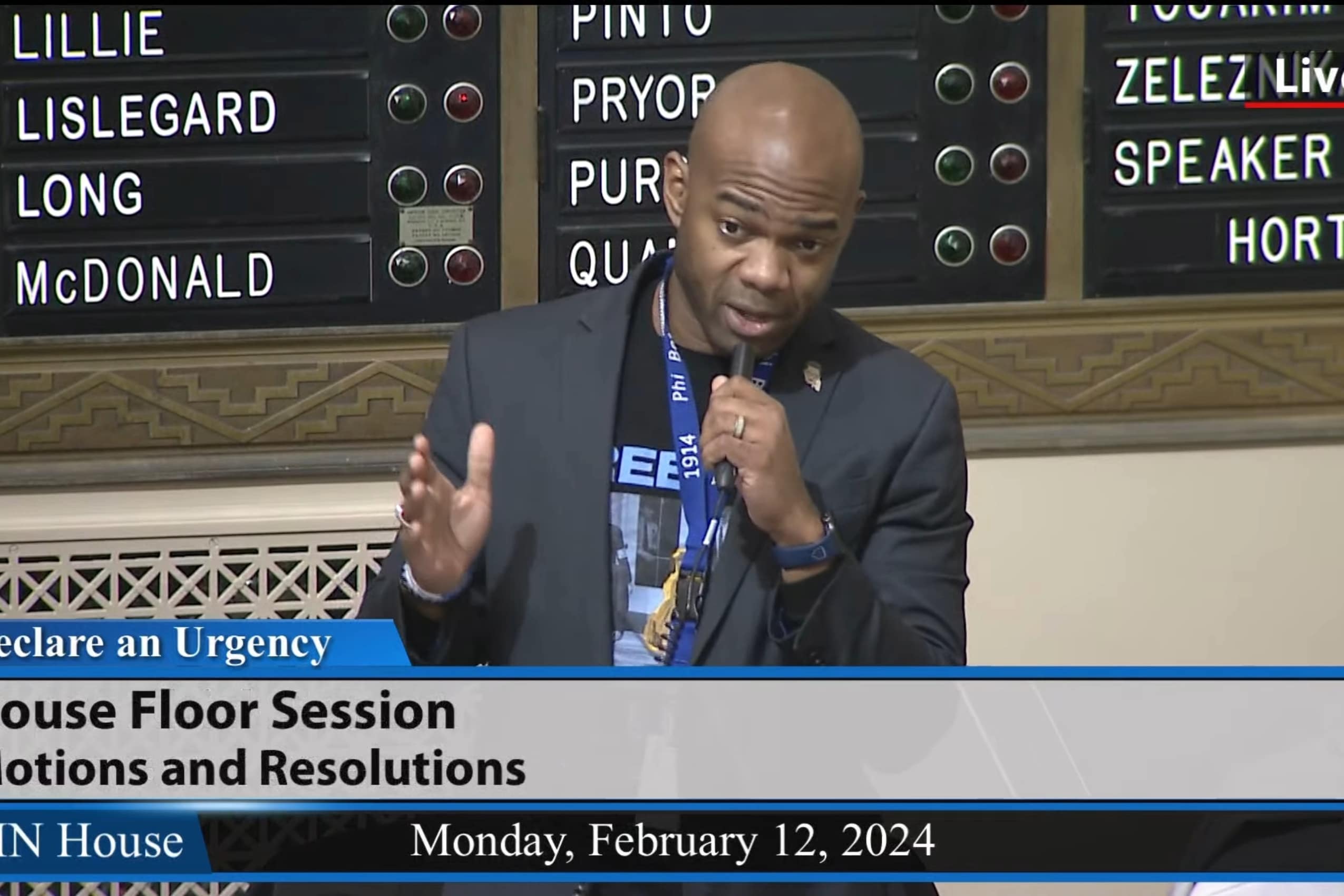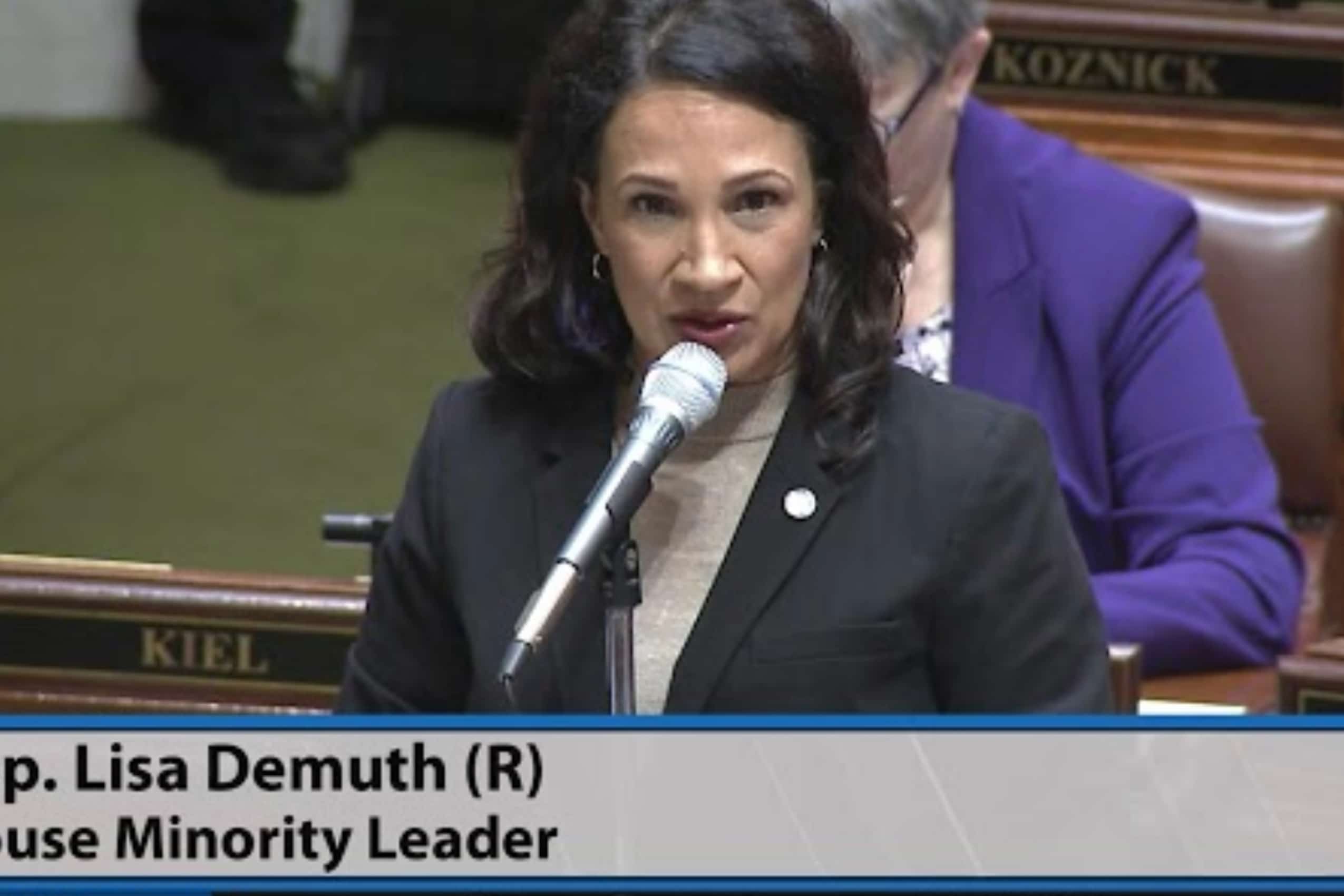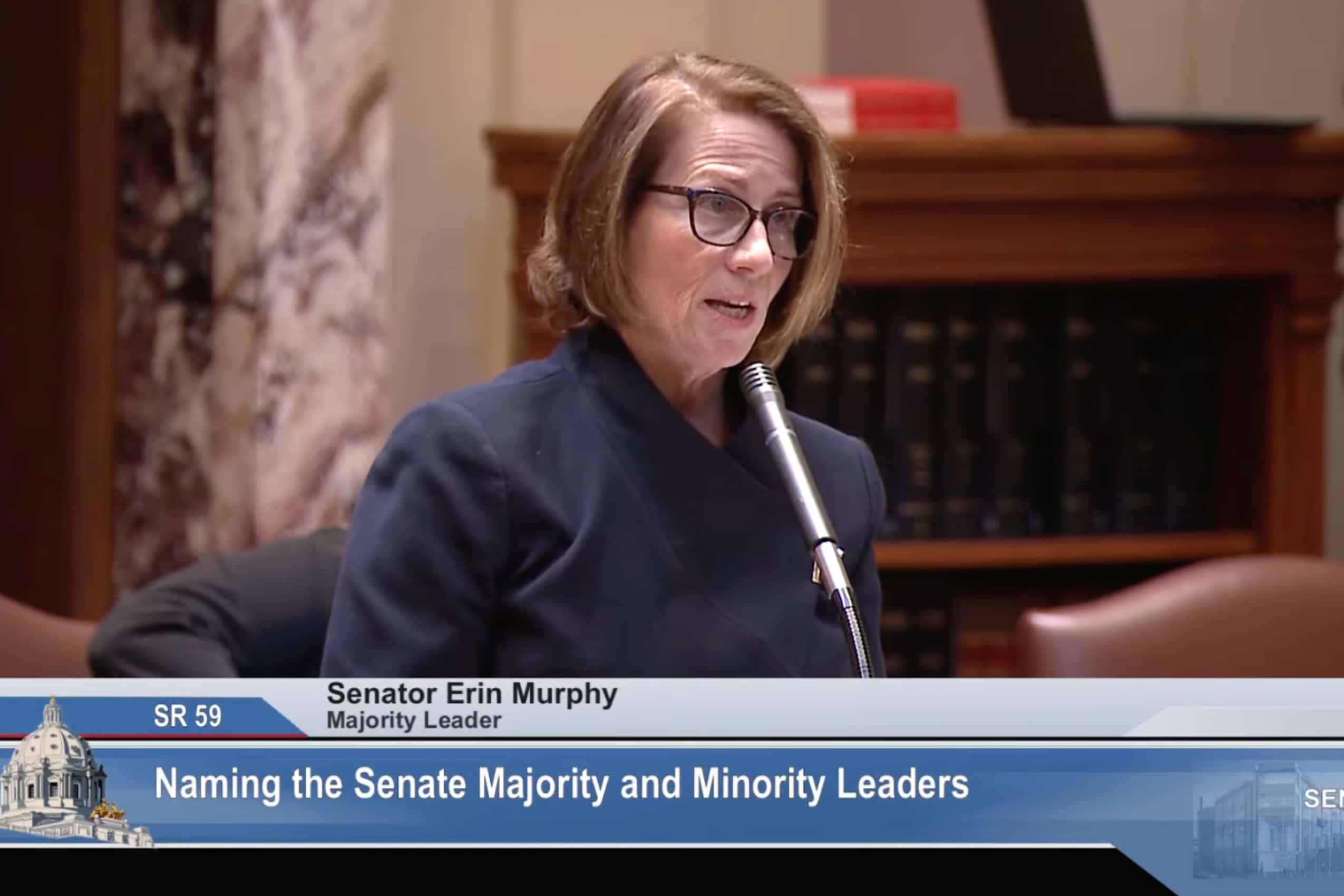
Republicans in the Minnesota House of Representatives wasted no time in the opening moments of the 2024 legislative session in attempting to fast-track passage of a seemingly bipartisan proposal to fix a new law enacted last year that has hampered the work of school resource officers in several public schools across the state.
But the author of that bill ended up being the GOP’s biggest stumbling block in attempting to pass it on the House floor Monday.
Rep. Cedrick Frazier, DFL-New Hope, is sponsoring HF3489, which would clarify instances when SROs or staff can apply the use of reasonable force in school. It would also establish minimum training requirements for SROs and create a school resource officer model policy, to be created by a number of stakeholders in the law enforcement and education industries.
“This bill creates a process for those stakeholders to be heard,” Frazier said on the House floor on Monday, explaining his opposition to Republican efforts to declare an urgency on the legislation and pass it immediately. “It creates a process to create comprehensive uniformity and transparency throughout the state. We don’t have that right now.”
Frazier and all but two of his Democratic colleagues in the House voted down a motion by Minority Leader Lisa Demuth, R-Cold Spring, to suspend House rules requiring bills to complete a full committee hearing process before coming to the House floor for passage.
“Democrats have delayed fixing this long enough, leaving our students and schools less safe,” Demuth said as she called on her colleagues to support a “declared urgency” to bring the bill to a floor vote.
“We heard our governor say he wanted a quick fix on this; a quick fix would have been a special session at the end of August. That did not happen. We know that all schools that choose to have SROs should have them back in their schools immediately.”
The current SRO law, which came into effect last August, limits when officers are allowed to restrain students. A number of police departments, county sheriffs and law enforcement associations spoke out against the changes, which largely flew under the radar during the 2023 legislative session and were swept into an omnibus education bill.

Republicans held listening sessions with testimony from the public on how the bill was impacting the safety of schools, and a number of legislators and law enforcement officials asked Gov. Tim Walz to call a special session to fix the issues with the bill. Walz said he was open to a special session, but told the public and legislative leaders he preferred to make the fix a top priority during the 2024 session. Despite overall bipartisan support for fixing the law, 44 Democrats in the legislature signed onto a letter last fall saying they would not support amending the law.
While the House Education Policy Committee heard a number of testifiers speak about the bill later in the afternoon, all 62 Republicans voted to support Demuth’s motion to clear the bill for passage on the floor. 68 DFL House members voted against the motion after Frazier urged his colleagues to remain patient and give the bill a full committee hearing. Rep. Dave Lislegard, DFL-Aurora, was in the chamber but did not cast a vote on the measure.
“We should not bypass that process,” Frazier said. “The complaint was that we bypassed that process before; we should not do it now.”
Assisted suicide bill debated
The House appears to be divided along party lines over a physician-assisted suicide bill that has come to the forefront of hot-button issues leading into the new legislative session.
Republicans attempted to put HF1930 on the back burner Monday as Minority Leader Demuth urged her caucus to vote no on a committee report over the “End of Life Options Act” that is sponsored by a handful of Democrats in both chambers. Last month, the DFL-controlled House held a rare pre-session hearing on the bill, which included more than four hours of testimony from supporters and opponents.
“Democrats could have heard any bill during the interim,” Demuth said, criticizing the majority for advancing the bill through its first committee stop before it accomplished anything else related to the 2024 legislative session. “They could have heard public hearings on SRO fixes, could have heard hearings on reducing taxes for Minnesotans, making our lives more affordable, but instead the only bill that was given a hearing during the interim was one on physician-assisted suicide.”
“I can tell you we haven’t really heard from Minnesotans this being their top priority,” Demuth added.
While the bill’s chief author in the House, Rep. Mike Freiberg, DFL-Golden Valley, didn’t defend his proposal on the floor, Health Policy and Finance Committee Chair Rep. Tina Liebling batted down Demuth’s criticism.

“We can walk and chew gum at the same time,” said Liebling, a 10-term Democrat from Rochester. “We gave this bill a hearing during the interim because we knew that we have a lot of work to do this session. This was a bill that we knew really needed a lot of time for people to weigh in and indeed we heard it for, I think, about four or maybe five hours we allowed people to testify.”
All 70 Democrats voted to approve the committee report on the proposal, which allows it to move to its next committee stop, Public Safety. A date hasn’t yet been set for that hearing. While the bill is likely to pass the House, it would need Republican support in the Senate, where one DFLer has already said he will vote “no” on the legislation.
New faces, missing faces, new leadership
While 2023 was a non-election year for both the House and the Senate, there were a few changes in both chambers.
The House greeted its newest member, Rep. Bianca Virnig, DFL-Eagan, on Monday. She replaces Ruth Richardson, who resigned last summer after a number of criticisms she received over her role as CEO of the regional chapter for Planned Parenthood. Virnig will complete Richardson’s second year of her term, and run again for re-election in November. The former Rosemount-Apple Valley-Eagan School Board member will serve on the House Elections Finance and Policy, Human Services Finance, and Education Finance committees this session.
Those who pay attention to the voting totals on the House floor will notice that there’s just 133 names on the voting board. On Sunday, seven-term Rep. Kurt Daudt, R-Crown, officially resigned from the House. The former speaker of the House announced his decision in January to leave the legislature and set his resignation date for the day before the 2024 session begins. A special election will be held later this spring to replace Daudt in a seat that is expected to remain in Republican hands. While that vacancy remains unfilled, Democrats increase their advantage to 70-63 this session.
In the Senate, Democrats spent their opening moments of session officially installing their new majority leader, Sen. Erin Murphy, DFL-St. Paul. The two-term senator and former longtime member of the House becomes the top-ranking Democrat in the Senate, after Kari Dziedzic announced one week ago that she would be stepping away from leadership to continue her battle with cancer. Dziedzic will keep her Senate seat and participate in her committee assignments when able. Bobby Jo Champion, DFL-Minneapolis, remains Senate president, the second-ranking spot for the DFL Senate Caucus, which has just a one-member advantage over Republicans.

Both Murphy and Senate Minority Leader Mark Johnson, R-East Grand Forks, expressed mutual optimism that they would be able to work well together as leaders of their respective caucuses in the coming months.
While Johnson said he was sad to see Dziedzic step down from her leadership role, he congratulated Murphy.
“I look forward to working in a bipartisan manner with you,” Johnson said in a short address on the Senate floor. “I have a lot of high hopes with our relationship. The work that the people of Minnesota ask us to do in a very bipartisan manner.”
Murphy returned the pleasantries, saying that the 2023 session under Dziedzic’s leadership “has been more civil, more professional and it’s been incredibly productive.”
“Let’s keep that up together for the people of Minnesota. I’m in if you are,” Murphy, a former nurses union leader and one-time gubernatorial candidate, told her colleagues.
Hank Long
Hank Long is a journalism and communications professional whose writing career includes coverage of the Minnesota legislature, city and county governments and the commercial real estate industry. Hank received his undergraduate degree at the University of Minnesota, where he studied journalism, and his law degree at the University of St. Thomas. The Minnesota native lives in the Twin Cities with his wife and four children. His dream is to be around when the Vikings win the Super Bowl.











